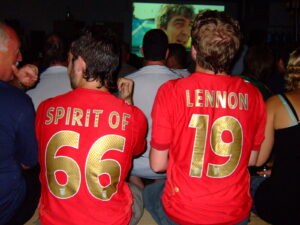Black History Month: Remembering Africa’s 1966 World Cup Boycott
The 1966 World Cup is remembered as England’s only triumph on football’s greatest stage.
A gleeful Bobby Moore is the cover image of this heroic tale and Geoff Hurst steals the final act with a hat-trick in the climactic 4-2 victory over West Germany.
The 1966 World Cup, then, is England’s story.
Bobby Moore parades the Jules Rimet Trophy
Or so it would seem.
This article tells another story, remembering ’66 for the absence of an entire continent.
No African team featured in England that summer as the continent united in boycott to protest FIFA’s eurocentrism.
Global politics, not just football matches, were being contested at this World Cup.
FIFA, UEFA, and the ‘wind of change’
“The wind of change is blowing through this continent, and, whether we like it or not, this growth of national consciousness is a political fact.”
This was Harold Macmillan, UK prime minister, speaking in Cape Town during February 1960.
The so-called ‘wind of change’ would bring seventeen African nations to independence in that same year, leaving post-colonial leaders to instil national consciousness and challenge an unequal global order.
Sports, but especially football, were important in these processes.
Quickly, the beautiful game became a hallmark of national identity and a platform for continental coordination.
Kwame Nkrumah, pan-African pioneer, stands to the left of Harold Macmillan
Ghanaian president Kwame Nkrumah used sports to champion pan-African ideals.
The Nkrumah Gold Cup, a West African football tournament charged with pan-African ambitions, was founded in 1960. Awarding the inaugural title, Nkrumah urged that competitors remember the ethos of the games.
“They will take back with them the seed of unity between our countries. I hope that they will scatter this seed among the youth and tend to growth with care, so that sportsmen may make their special contribution to the unity which we all cherish.”
In the following years, African voices rose to challenge global sporting inequities as well as political and economic ones.
A July 1964 edition of the Evening News, published from Ghana’s capital city Accra, did exactly that under the title ‘African Unity and Sports.’
“We have shaken ourselves from the adamantine chains and it is our duty and right to prove to them that the African, when given the chance, can rise to the occasion.”
FIFA did not readily award these chances.
The ‘wind of change’ had caused a storm amongst European delegates. The influx of Asian and African delegates after 1945 diluted Europe’s voting power and a growing paranoia inspired new forms of coordination amongst Europe’s footballing bodies.
The creation of UEFA in 1954 stemmed, in part, from these concerns. Gustav Weiderkehr, its president between 1962 and 1972, described FIFA’s expanding membership as “somewhat dangerous.”
Africa abstains
The dominant position of Europe within FIFA became clear in January 1964 with the publication of World Cup qualifying allocations.
Africa and Asia were assigned one shared slot — FIFA had sanctioned the wholesale exclusion of one of these continents.
Ohene Djan, head of Ghana’s Central Organisation of Sports, began rallying for a continent-wide boycott. His campaign quickly gained momentum and, in February, the Confederation of African Football sent word to FIFA.
“We limit our demand, in the name of fair play and equity for one place of finalist to be granted to Africa… in the absence of this necessary adjustment African Associations cannot for the considerations stated above participate in the World Cup Jules Rimet Championship, 1966.”
In October 1964, CAF responded to eight months of FIFA inaction by confirming that none of the fifteen eligible African teams would take to the World Cup stage.
Nor would Asia.
With the exception of North Korea, who went on to compete at the tournament, representatives withdrew their teams from contention.
Two years after England had claimed victory at the World Cup, delegates celebrated a victory of their own.
FIFA allocated a qualifying slot to both Africa and Asia ahead of the 1970 world cup, and Morocco and Israel took to the field in Mexico as representatives for each continent.
Today, continuing pressure is bearing fruit.
The revised 48 team format set to debut at the 2026 World Cup has nearly doubled the representation of African teams. CAF now holds nine places, compared to five in 2022.
Morocco will co-host the 2030 World Cup after a historic run to the World Cup semi-finals in 2022.
Europe’s jump from thirteen to sixteen allocations is less sharp, but they still hold the majority.
Though imbalances remain, the signs are positive. A struggle that begins with Ohene Djan in the 1960s is paving the way for an ever-growing number of African nations to ‘rise to the occasion.’

England fans will continue to cling to ’66 — the apparent certainty of heartbreak on the world stage demands it.
But, just maybe, the victors are not the only team that should be remembered from that tournament. Maybe we should spare a thought for those who remained home in defiance.
Maybe the name Ohene Djan should be as synonymous with 1966 as that of Geoff Hurst.